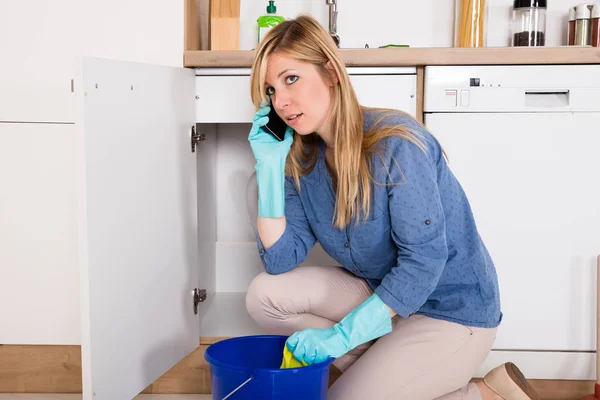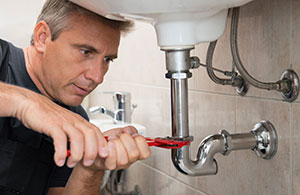What are your thoughts regarding Plumbing Emergencies: Tips on What To Do Before?

Pipes emergencies can strike any time, causing anxiety and potential damage to your home. Whether it's a ruptured pipeline, a clogged up drain, or a dripping faucet, recognizing how to handle the scenario until an expert plumbing technician gets here can save you from additional difficulties. This article supplies necessary emergency situation pipes tips to help you alleviate damages and restore control throughout a plumbing dilemma.
Switch off the Supply Of Water
The very first step in any pipes emergency is to shut down the supply of water. For local issues, such as a leaking tap or toilet, shut off the shutoff near the component. When it comes to a major leak or ruptured pipeline, locate your home's primary water shut-off valve and transform it off instantly. Understanding the area of these valves in advance can conserve valuable time during an emergency situation.
Address Tiny Leaks with Short-term Repairs
Tiny leakages can quickly end up being considerable troubles if left unchecked. Utilize these momentary solutions till professional help arrives:
While these fixes aren't permanent, they can help decrease water loss and damages.
Unclog Drains Pipes Securely
A stopped up drain can be a discouraging and untidy issue. Here's just how to tackle it:
If these methods do not work, avoid utilizing too much pressure, as it may intensify the clog.
Take Care Of Overflowing Toilets
An overflowing toilet can cause instant turmoil. Below's what you need to do:
Turn off Your Water Heater
In certain emergency situations, such as a ruptured pipe, it's wise to shut off your hot water heater. This stops overheating or damages to the system when water stops flowing. Turn off the power supply to the water heater (electrical or gas) and allow it cool to prevent prospective risks.
Briefly Quit a Ruptured Pipeline
A ruptured pipeline can cause considerable water damage in minutes. To reduce the problem:
Call a professional plumbing technician promptly to address the trouble permanently.
Manage Frozen Pipes Thoroughly
In chillier environments, frozen pipelines are an usual emergency. If you presume an icy pipeline:
Avoid More Damage
Taking quick activity to reduce damage can conserve you time and money over time. Here's exactly how:
. Have an Emergency Pipes Kit
Prepare a fundamental pipes emergency set to handle minor concerns effectively. Your set needs to include:
Having these tools handy can make a substantial difference in your ability to handle emergency situations.
Know When to Call a Professional.
While quick fixes can assist momentarily, certain plumbing problems call for immediate specialist attention. Call a plumbing if:.
Immediately contacting a professional guarantees the issue is fixed properly and protects against more difficulties.
Conclusion.
Plumbing emergencies can be overwhelming, but with the best knowledge and devices, you can take care of the situation effectively till aid arrives. By turning off the supply of water, dealing with little leaks, and utilizing short-term repairs, you can reduce damage and keep your home safe. Bear in mind, these pointers are short-lived solutions; constantly get in touch with a qualified plumber to manage the source of the issue. Preparation and quick thinking are your best allies in any kind of pipes emergency situation.
8 Helpful Tips for Managing Plumbing Emergencies at Home
If your plumbing system hasn’t failed once, wait for it because almost everyone has a story to tell. Sometimes, it could be simple emergencies such as a leaking pipe, a blocked cistern, or even a big burst pipe. In situations like this, you need to have some handy tips to save you some money and from possible damages.
Take care of minor issues early.
Sometimes, you could have avoided an emergency by taking proactive measures while it was still early. Some major plumbing emergencies can be a result of an ignored minor issue. We recommend that you have items like plumbing tapes and other related items. A plumbing tape can allow you to manage minor leaks before the plumber arrives.
Cut off the water supply.
This tip is essential in almost any type of leakage problem. For problems like minor leakages in the toilet or kitchen, turn off the supply that takes water to the affected pipes. If the leakage is a major pipe, you must shut off the supply valve to the entire building. This will help you avoid flooding your home and neighbors if you share a flat.
Know your plumbing system
Folks typically move into a new apartment without understanding the water supply around the building. This can prove disastrous if a water emergency arises and the plumber is far away. The previous tip will prove useless if you don’t practice this one. More importantly, know where your water shut-off valve is located – you’ll need that knowledge to prevent potential home floods.
Have some common handy tools
There are lots of plumbing emergencies that you can handle without hiring a plumber. That’s why you must keep some tools available always. Some tools that you can use to fix simple plumbing emergencies easily include plumbing tapes, screwdrivers, thread seal tapes, plungers, pliers, tape measures, and rubber gloves.
Insulate your pipes from cold
You’ll save yourself from many plumbing expenses if you protect your water pipes from the cold. This is because of the harmful effects that cold weather can have on your pipes. During winter, your pipes can burst from being overly expected to freezing temperatures. So, make sure insulators are there to keep the pipes working correctly.
Avoid practices that will clog your toilet.
Many people indulge in practices that can damage the plumbing system of the entire building. One of these is when they use their toilet to dispose-off garbage. They flush all kinds of things, such as paper towels, bandages, hairs, female sanitary products, etc., down the toilet. This will block your toilet in the long run, incurring unnecessary expenditures. Dump such waste in the trash instead.
Check your dials regularly.
Sometimes, there could be leakages in your home without noticing them in time. So, constantly monitor your water meter dial. If the dial is reading when there is nobody using water, this is an indicator that there is leaking. Check for leaks immediately. Call a plumber as soon as possible if you can’t find any.
https://www.constructionplacements.com/8-helpful-tips-for-managing-plumbing-emergencies-at-home/

As a fervent reader about What to Do During a Plumbing Emergency, I figured sharing that piece of content was worth the trouble. Sharing is caring. You won't know, you could be doing someone a favor. I love reading our article about .
Call Today